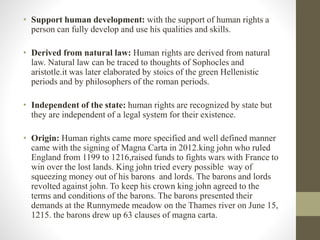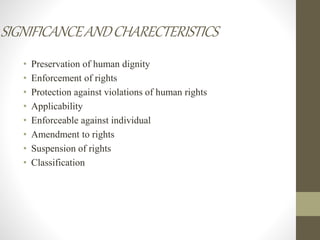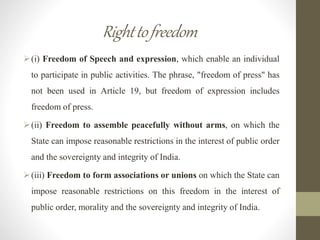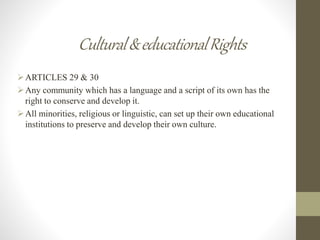Human Rights
- 2. CONCEPTOFHUMANRIGHTS • The rights inherent to all human beings, whatever our nationality, place of residence, sex, national or ethnic origin, colour, religion, language, or any other status. • We are all equally entitled to our human rights without discrimination. • These rights are all interrelated, interdependent and indivisible. • The universal declaration of Human Rights defines human rights as rights derived from the inherent dignity of the human person .
- 3. CHARACTERISTICSOFHUMANRIGHTS • Universal : Human Rights belong to each and every one of us. The values which form the basis of those rights are inherent in human nature. • Purpose: Human rights not only in protection but also the prevention of gross violations of human dignity .human rights allow people to develop or use their inborn qualities and talent in order to satisfy spiritual and material needs. • Condition of social life: without human rights it is difficult to live a good life in society . In the absence of socially accepted human rights ,unethical members of society would have openly exploited innocent people. • Minimal rights: Justice durga das basu pointed out that human rights are minimal rights which every individual must have against the state or other public authority.
- 4. • Support human development: with the support of human rights a person can fully develop and use his qualities and skills. • Derived from natural law: Human rights are derived from natural law. Natural law can be traced to thoughts of Sophocles and aristotle.it was later elaborated by stoics of the green Hellenistic periods and by philosophers of the roman periods. • Independent of the state: human rights are recognized by state but they are independent of a legal system for their existence. • Origin: Human rights came more specified and well defined manner came with the signing of Magna Carta in 2012.king john who ruled England from 1199 to 1216,raised funds to fights wars with France to win over the lost lands. King john tried every possible way of squeezing money out of his barons and lords. The barons and lords revolted against john. To keep his crown king john agreed to the terms and conditions of the barons. The barons presented their demands at the Runnymede meadow on the Thames river on June 15, 1215. the barons drew up 63 clauses of magna carta.
- 5. EvolutionofHumanRights Theology and religion: In a religious context every human being is considered connected with god. Old sign give us the premise that Adam was created in the ‘image of God'. The Quran talks of Man as ‘unit’ of existence .the Upanishads and Gita talks of the ‘Brahman atman unity, .thus bringing study of religion in man. Accepting a universal common father thus gives rise to a common humanity and from this can be derived the universality of human rights.
- 6. Magna Carta: • The Magna Carta, or “Great Charter,” was arguably the most significant early influence on the extensive historical process that led to the rule of constitutional law today in the English-speaking world. • In 1215, after King John of England violated a number of ancient laws and customs by which England had been governed, his subjects forced him to sign the Magna Carta, which enumerates what later came to be thought of as human rights. • Widely viewed as one of the most important legal documents in the development of modern democracy, the Magna Carta was a crucial turning point in the struggle to establish freedom.
- 7. Theory of natural law: • Natural law can be traced to the thoughts of Sophocles and Aristotle .it was later elaborated by the stoics of the Greek Hellenistic period and by philosophers of roman periods. • Natural law contain all those elementary principles of justice. Which is in accordance with nature ,which is unalterable and eternal. • According to Grotius a natural characteristics of human beings is the need to live with other beings in peace and harmony. • Grotius defined natural law as a dictate of right reason. Was also recognized as father of modern international law.
- 8. The Natural Right Theory: • in ancient times there was a doctrine known as the Doctrines of Natural Law. These doctrines held that because people are creatures of God and nature, they should be able to live their lives based on the rule of God or nature. As time went on, a man by the name of John Locke helped to modify these doctrines of natural law, based on his belief that everyone was naturally good and rational. Because he believed that the government was obligated to serve the people, and protect their natural rights, he strived for a government that really represented the people and their interests. This lead to the modern concept of natural rights -- not only do we have these rights, but no person or society can violate or take those rights from us.
- 9. The universal declaration of human rights: • The provision of the united nation written grant did not specifically spell out details of human rights. • Human rights were to be recognised,promoted and protected • Through an international bill of human rights(IBHR).this was on the lines of the British bill of right and American bill of right . • The IBHR was to contain a declaration which would for the first time in human history .have universally accepted right and a agreement having specific provision for its implementation. • The commission on human right first drafted the UDHR which was adopted by the general assembly on 10 December 1948 at its meeting in Paris. • As a result two covenant were adopted namely , the international covenant on civil and political rights and the international covenant on economics,social and cultural rights.
- 10. FUNDAMENTALSRIGHTINTHECONSTITUTION • The Part III of the Constitution of India gives a detailed description on a charter of rights called the ‘Fundamental Rights'. • These fundamental rights guarantee civil freedom to all the citizens of India to allow them to live in peace and harmony. These are the basic rights that every Indian citizen has the right to enjoy, irrespective of their caste, creed and religion, place of birth, race, color or gender. • These fundamental rights include Right to Equality, Right to Freedom, Right to Freedom of Religion, Cultural and Education Rights, Right against Exploitation, Right to Constitutional Remedies, etc. • Anyone guilty of the non-compliance to such Fundamental rights will be punished as mentioned in the Indian Penal Code, subject to the verdict of the judiciary. Fundamental rights for Indians aim at narrowing down the inequalities of pre-independence social practices, especially the abolition of untouchability. • They also guarantee the protection of cultural and educational rights of some religious minorities by granting them the liberty to conserve their languages and educational institution.
- 11. SIGNIFICANCEANDCHARECTERISTICS • Preservation of human dignity • Enforcement of rights • Protection against violations of human rights • Applicability • Enforceable against individual • Amendment to rights • Suspension of rights • Classification
- 13. SIXFUNDAMENTALRIGHTS The Right to EQUALITY The Right to FREEDOM The Right to Freedom from EXPLOITATION The Right to FREEDOM OF RELIGION Cultural and EDUCATIONAL Rights The Right to CONSTITUTIONAL REMEDIES
- 14. Righttoequality
- 15. Righttoequality (i) Equality before Law :- Article 14 of the constitution guarantees that all citizens shall be equally protected by the laws of the country (ii) Social equality and equal access to public areas:- Article 15 of the constitution states that no person shall be discriminated on the basis of caste, colour, language etc. Every person shall have equal access to public places like public parks, museums, wells, bathing ghats and temples etc. However, the State may make any special provision for women and children.
- 16. Righttoequality (iii) Equality in matters of public employment:- Article 16 of the constitution lays down that the State cannot discriminate against anyone in the matters of employment. All citizens can apply for government jobs. (iv) Abolition of untouchability :- Article 17 of the constitution abolishes the practice of untouchability. Practice of untouchability is an offense and anyone doing so is punishable by law. (v) Abolition of Titles:- Article 18 of the constitution prohibits the State from conferring any titles. Citizens of India cannot accept titles from a foreign State.
- 17. Righttofreedom
- 18. Righttofreedom (i) Freedom of Speech and expression, which enable an individual to participate in public activities. The phrase, "freedom of press" has not been used in Article 19, but freedom of expression includes freedom of press. (ii) Freedom to assemble peacefully without arms, on which the State can impose reasonable restrictions in the interest of public order and the sovereignty and integrity of India. (iii) Freedom to form associations or unions on which the State can impose reasonable restrictions on this freedom in the interest of public order, morality and the sovereignty and integrity of India.
- 19. Righttofreedom (iv) Freedom to move freely throughout the territory of India though reasonable restrictions can be imposed on this right in the interest of the general public, for example, restrictions may be imposed on movement and travelling, so as to control epidemics. (v) Freedom to reside and settle in any part of the territory of India which is also subject to reasonable restrictions by the State in the interest of the general public or for the protection of the schedule tribes because certain safeguards as are envisaged here seem to be justified to protect indigenous and tribal peoples from exploitation and coercion.
- 20. Righttofreedom (vi) Freedom to practice any profession or to carry on any occupation, trade or business on which the State may impose reasonable restrictions in the interest of the general public. Thus, there is no right to carry on a business which is dangerous or immoral.
- 22. Rightagainstexploitation The abolition of trafficking in human beings and Begar (forced labour) Abolition of employment of children below the age of 14 years in dangerous jobs like factories and mines. Begar, practised in the past by landlords, has been declared a crime and is punishable by law Trafficking in humans for the purpose of slave trade or prostitution is also prohibited by law.
- 24. Righttofreedomofreligion According to the Constitution, all religions are equal before the State and no religion shall be given preference over the other. Citizens are free to preach, practice and propagate any religion of their choice. i. Religious communities can set up charitable institutions of their own. ii. Activities in such institutions which are not religious are performed according to the laws laid down by the government iii. No person shall be compelled to pay taxes for the promotion of a particular religion. iv. A State run institution cannot impart education that is pro-religion
- 26. Cultural&educationalRights ARTICLES 29 & 30 Any community which has a language and a script of its own has the right to conserve and develop it. All minorities, religious or linguistic, can set up their own educational institutions to preserve and develop their own culture.
- 28. Righttoconstitutionalremedies5 Right to constitutional remedies empowers the citizens to move a court of law in case of any denial of the fundamental rights. This procedure of asking the courts to preserve or safeguard the citizens' fundamental rights can be done in various ways. The courts can issue various kinds of writs. These writs are habeas corpus, mandamus, prohibition, quo warranto and certiorari.




























